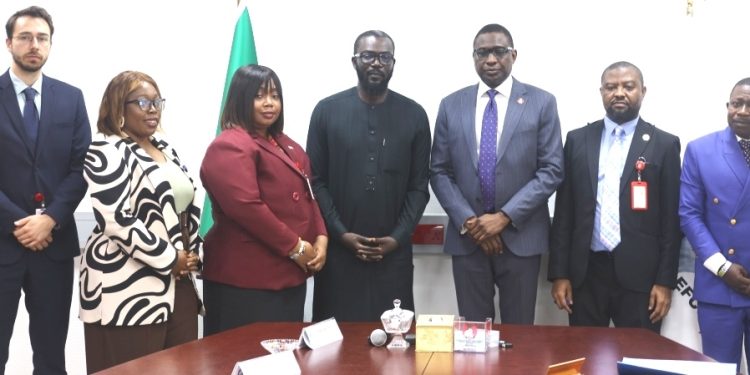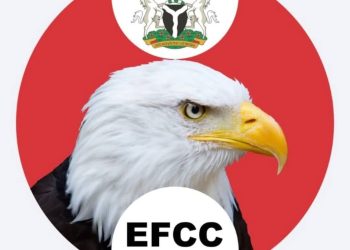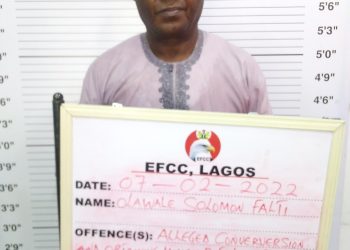By Nkechi Eze
The United Nations Office on Drugs and Crime (UNODC) has reaffirmed its commitment to deepening strategic collaboration with the Economic and Financial Crimes Commission (EFCC) in the fight against corruption, cybercrime, illicit financial flows, and other forms of transnational organized crime.
The renewed commitment was made on Tuesday, July 29, 2025, when a delegation from the UNODC, led by its Country Representative, Mr. Cheick Ousman Toure, paid a courtesy visit to EFCC Chairman, Mr. Ola Olukoyede, at the Commission’s corporate headquarters in Abuja.
In an official statement released by EFCC Spokesperson, Dele Oyewale, Mr. Toure outlined a new partnership framework adopted by the UNODC for Nigeria. He highlighted Nigeria’s leadership role in implementing global anti-corruption instruments such as the United Nations Convention Against Corruption (UNCAC) and the United Nations Convention Against Transnational Organized Crime (UNTOC).
“For us in UNODC, we have developed a new approach to partnership. Nigeria has been a leader, not only in ratifying key conventions but also in contributing to their documentation. We worked closely with the EFCC in 2014 and 2020, particularly on anti-money laundering initiatives. Now, we are moving from ad-hoc interventions to a jointly developed country programme, which has been approved by the UN as our five-year blueprint for Nigeria,” Toure stated.
Addressing the impact of global funding constraints, including an anticipated reduction in U.S. foreign aid from October 2025, Toure underscored the need for regionally driven and sustainable solutions. He noted that illicit financial flows continue to cost Africa billions of dollars annually and stressed the importance of Nigeria’s leadership in tackling the scourge.
“We must look at how we can support Nigeria in addressing illicit financial flows, which cost the continent billions annually. Nigeria is at the forefront of this fight, and its leadership should resonate at the sub-regional level,” he said.
The UNODC Country Representative further pointed to cybercrime, illegal mining, and limited enforcement at the sub-national level as growing threats. He pledged the organization’s support for EFCC in closing operational gaps, building stronger regional partnerships, and enhancing intelligence-sharing capabilities.
“We see an opportunity to work with EFCC on cybercrime, given that Nigeria is the only African country aligned with the Budapest Convention. We also want to help close the gaps in local enforcement so that EFCC operatives can be more effective at the state and community levels,” Toure added.
In response, EFCC Chairman, Mr. Ola Olukoyede, welcomed the UNODC delegation and described the visit as a reinforcement of a longstanding and productive partnership. He commended the UNODC’s support over the years and expressed the Commission’s readiness to expand cooperation in response to emerging challenges in organized crime.
“Our doors are always open to this kind of collaboration. Over the years, EFCC has tracked the record of UNODC, just as you have tracked ours. It is now imperative to broaden our partnership, especially considering the new dynamics in transnational crimes,” Olukoyede stated.
He also emphasized the Commission’s strategic shift toward reducing dependence on foreign aid, noting the development of home-grown mechanisms to fund anti-corruption operations. “We believe that we do not necessarily have to depend on foreign aid. We are already developing domestic mechanisms to fund some of our operations and we will continue to strengthen these efforts,” he said.
On the regional front, the EFCC Chairman reiterated the Commission’s leadership role within the Network of Anti-Corruption Institutions in West Africa (NACIWA) and called for a more robust framework for cross-border collaboration.
“The crimes we are tackling are transnational. If we are to defeat them, our cooperation must cut across jurisdictions. We need a secure platform for intelligence sharing, and we urge UNODC to help facilitate this,” he stated.
Olukoyede also identified illegal mining as a growing avenue for money laundering and disclosed that the Commission had already initiated actions to combat its illicit financial components.















